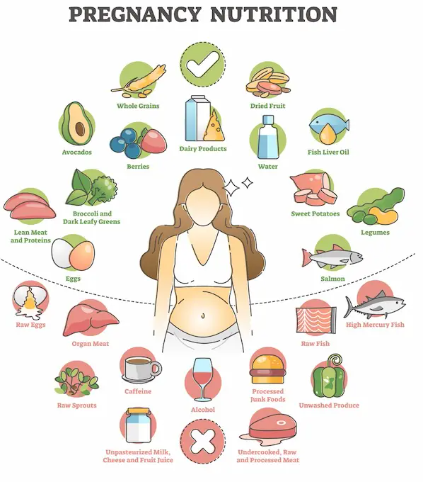Introduction:
Pregnancy is a delicate period for a woman, and her diet plays a crucial role in the growth and development of her baby.While a balanced diet that includes fruits is essential during pregnancy, it's important to note that not all fruits are safe to consume. Bananas, for instance, are often questioned in terms of their suitability during pregnancy. This article aims to explore why avoiding bananas during pregnancy might be advisable and suggests alternative fruit options.
Understanding Bananas:
Bananas are highly nutritious fruits, rich in vitamins, minerals, and fiber. They are low in calories and fat, making them a healthy snack choice.
Why You Should Avoid Bananas During Pregnancy:
However, bananas are also high in sugar and carbohydrates, which can contribute to weight gain if consumed excessively. Additionally, they are known to cause constipation, which can be uncomfortable during pregnancy.
Risks of Eating Bananas During Pregnancy:
Although bananas are generally considered a healthy food choice for most people, they can pose certain risks during pregnancy. Here are some reasons why you might consider avoiding bananas during this period:
High Potassium Content:
Bananas are high in potassium, which can be harmful to women with kidney problems. During pregnancy, the kidneys work harder, and consuming excessive amounts of potassium can lead to complications.
Risk of Gestational Diabetes:
Due to their high sugar and carbohydrate content, bananas can cause a spike in blood sugar levels. This increases the risk of developing gestational diabetes, which affects pregnant women who have never had diabetes before.
Allergic Reactions:
Some individuals are allergic to bananas, and allergic reactions during pregnancy can lead to complications. These reactions can range from mild to severe, and in rare cases, they can even be life-threatening.
Risk of Constipation:
Bananas are known to cause constipation, a common issue during pregnancy. Constipation can be uncomfortable and may lead to other health problems.
If you are pregnant and seeking healthy fruit alternatives to bananas, consider the following options:
Oranges:
Oranges are a good source of vitamin C, which is essential for the growth and development of your baby. They are low in calories and fiber, making them a healthy snack choice.
Apples:
Apples are a great source of antioxidants, which help protect your baby's cells from damage. They are low in calories and high in fiber, making them a healthy snack option.
Berries:
Berries, such as strawberries, raspberries, and blueberries, are good sources of vitamins and antioxidants. They are low in calories and high in fiber, making them a healthy snack option.
Pineapple:
Pineapple is a good source of vitamin C and contains an enzyme called bromelain, which can aid in digestion. However, it should be consumed in moderation during pregnancy, as excessive amounts can cause uterine contractions.
Apart from bananas, there are certain other fruits that pregnant women should avoid or limit, as they may pose a risk to both the mother and the developing baby. These include:
Papaya:
Raw or semi-ripe papaya contains a substance called papain, which can trigger uterine contractions and may lead to miscarriage or premature labor.
Pineapple:
Pineapple contains bromelain, which can soften the cervix and cause uterine contractions. Excessive consumption can lead to early labor or miscarriage.
Grapes:
Grapes may contain harmful pesticides and bacteria, which can cause food poisoning and other health problems in pregnant women.
Unwashed Fruits:
Fruits that have not been properly washed may harbor harmful bacteria, leading to food poisoning and other health issues.
Apart from fruit selection, there are other important dietary considerations for pregnant women to ensure the health and safety of their developing baby. These include:
- Avoiding raw or undercooked meat, which can contain harmful bacteria.
- Limiting consumption of fish with high levels of mercury, such as shark, swordfish, king mackerel, and tilefish.
- Avoiding raw or undercooked eggs due to the risk of salmonella contamination.
- Avoiding unpasteurized dairy products, which may contain harmful bacteria.
- Minimizing the intake of processed and junk food, which are often high in salt, sugar, and unhealthy fats.
- Completely abstaining from alcohol consumption, as it can lead to fetal alcohol syndrome and congenital disabilities.
- Limiting caffeine intake, as high levels have been linked to low birth weight and other health problems in newborns.
Conclusion:
In conclusion, while bananas are generally nutritious, they should be avoided during pregnancy due to their potential risks. High potassium content, the risk of gestational diabetes, allergic reactions, and constipation are factors to consider. Instead, pregnant women can opt for alternative fruits such as oranges, apples, berries, and pineapples. It is important to consult healthcare providers before making any dietary changes during pregnancy to ensure personalized advice and a safe and healthy journey for both mother and baby.






0 Comments